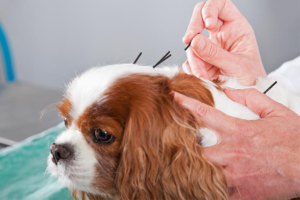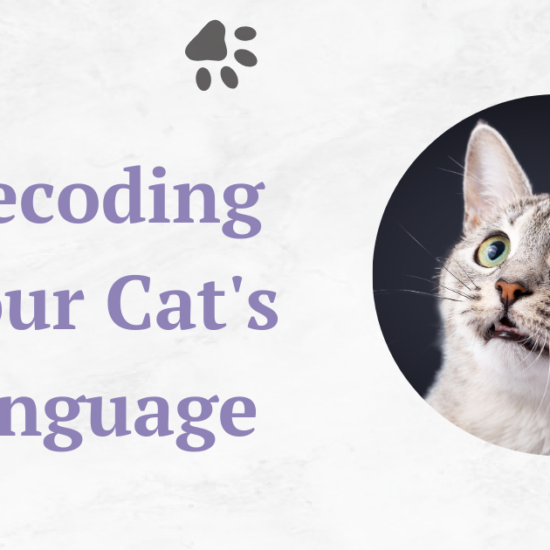Our pets are family members, providing unconditional love and companionship. Responsible pet owners must ensure their health and well-being. Traditional veterinary medicine has advanced, but many pet owners are using alternative therapy for pets. Herbal remedies and acupuncture for pets are popular alternative therapies for pets because they improve quality of life and treat various ailments.
Table of Contents
Introduction
This extensive article covers acupuncture for pets and herbal remedies. We will discuss the history, principles, and uses of these treatments, as well as their benefits, risks, and integration with conventional veterinary care. By the end of this article, you’ll understand how alternative therapies can improve your pets’ health.
Basics of Alternative Therapies for Pets
Alternative Medicine Understanding
Alternative medicine, also known as complementary or integrative medicine, encompasses a wide range of healing methods outside of conventional medicine. Alternative medicine focuses on the whole pet rather than just symptoms. Our beloved pets benefit from this holistic approach to improve their physical, emotional, and spiritual health.
Alternative medicine recognizes that pets, like humans, have complex needs. It goes beyond treating physical ailments to improving quality of life. This holistic view recognizes that health includes vitality, contentment, and a harmonious relationship with others, as well as the absence of disease.
History
Ancient civilizations recognized the importance of holistic healing for domesticated animals, which led to alternative therapies for pets. Herbal remedies, acupuncture for pets, and energy healing were used to keep animals healthy across cultures.
The ancient Egyptians revered cats for their mystical power and used natural remedies and rituals to protect them from illness and evil spirits. Aristotle, a Greek philosopher, advocated holistic care that considered animals’ diet, environment, and emotions. Horse acupuncture in China dates back thousands of years, reflecting the belief that animals and humans share life forces and energy channels.
These ancient traditions inspired modern veterinary medicine’s alternative therapies for pets. These time-tested methods for pets are gaining popularity as society reconnects with holistic and natural health.
Holistic Healing Principles
Alternative medicine’s holistic healing emphasizes the interconnectedness of all aspects of well-being. This approach includes mental, emotional, and spiritual aspects. It emphasizes that pets’ health is not solely determined by genetics or physical condition.
Holistic healing is important for animals because their environment affects their health. Harmony and stress-free living improve their health. Diet and nutrition are also important because food affects their health, energy, and immune system.
Also important is the recognition that pets have emotional and spiritual aspects. Joy, anxiety, and grief can greatly impact their health. Pets’ relationship with their owners is precious.
Acupuncture for Pets

In veterinary care, acupuncture for pets is a type of physical therapy for pets. It is an ancient Chinese healing technique that may benefit dogs, cats, horses, and exotic pets. Acupuncture involves inserting fine needles into body points called acupuncture points. Along body energy pathways, or meridians, these points are strategically placed. Human and animal acupuncture stimulates and balances energy, or “Qi” or “Chi.”
Veterinary acupuncture adapts human principles to animal anatomy and physiology. Pet acupuncture is becoming a recognized alternative therapy for pets that can enhance veterinary care and promote well-being.
How Does Acupuncture for Pets Work?

Acupuncture is physical therapy for pets that balances body systems. Needle insertion at acupuncture points releases neurotransmitters and hormones. These substances provide several benefits:
- Pain Relief: Acupuncture is famously analgesic. Endorphins, the body’s natural painkillers, can relieve musculoskeletal, chronic, and post-surgical pain.
- Inflammation Reduction: Acupuncture modulates the immune system to reduce inflammation. Inflammatory bowel disease and arthritis benefit from this.
- Stimulation of Healing: The body’s natural healing processes are accelerated by acupuncture. It improves blood circulation, tissue oxygenation, and cell regeneration.
- Balance Energy Flow: Acupuncture balances Qi or Chi to restore balance. Rebalancing can fix health issues’ root causes.
Conditions Treated With Acupuncture for Pets

One of the biggest benefits of veterinary acupuncture is its versatility. It can treat physical and behavioral pet health issues. Acupuncture treats common conditions:
- Musculoskeletal Problems: Acupuncture’s pain-relieving and anti-inflammatory effects help with arthritis, hip dysplasia, and back pain.
- Neurological Disorders: Acupuncture for pets promotes nerve regeneration and reduces inflammation, helping manage intervertebral disc disease and nerve injuries.
- Gastrointestinal Issues: Inflammatory bowel disease, chronic diarrhea, and vomiting can be treated with acupuncture to modulate the gut’s immune response and reduce inflammation.
- Behavioral Issues: Acupuncture can calm and stabilize pets, reducing anxiety, stress, and aggression.
How Acupuncture for Pets Takes Place

An experienced veterinary acupuncturist evaluates pets before starting acupuncture. This assessment covers the pet’s medical history, symptoms, and lifestyle. The practitioner must understand the pet’s health to create a customized acupuncture plan.
Acupuncturists insert thin, sterile needles at specific points. The pet’s condition and needs determine the needle number and location. When the pet is relaxed, needles are left in for 15–30 minutes.
These sessions succeed when pet owners keep their pets comfortable and create a calm, supportive environment. Trust and bond between pet and owner can boost acupuncture’s therapeutic effects.
Advantages and Risks of Acupuncture for Pets

Pet acupuncture’s holistic approach improves overall health. Key benefits include:
- Minimal Side Effects: Acupuncture has fewer side effects than pharmaceuticals.
- Complementary Therapy: Combining traditional veterinary care with complementary therapy can reduce medication use and improve the pet’s quality of life.
- Non-Invasive: Pets with medication sensitivities or allergies can benefit from non-invasive acupuncture.
Acupuncture is safe, but there are risks and contraindications. Infection, localized discomfort during needle insertion, and rare adverse reactions are possible. To reduce these risks, see a veterinary acupuncturist who understands animal needs and sensitivities.
Pet Herbal Remedies

Veterinarian Herbal Medicine
Herbal medicine has been used in human and veterinary care for centuries. Ancient civilizations passed down indigenous knowledge of using herbs to treat animal ailments. Herbal medicine for pets has seen a resurgence in popularity as pet owners seek natural and holistic alternatives to pharmaceuticals.
The holistic approach to veterinary health and well-being makes herbal medicine appealing. Like humans, animals are complex beings whose health is affected by genetics, diet, environment, and emotions. Herbal remedies are gentle but effective for these complex pet health issues.
Types of Herbal Remedies

Pet herbs come in many forms to suit different needs and preferences. Common herbal remedies include:
- Herbal Supplements: Herbal supplements are easy for pet owners to administer as capsules or tablets. Supplements may contain therapeutic herb blends.
- Tinctures: Herbal tinctures are alcohol or glycerin-steeped liquid extracts. Concentrated ones allow precise dosing. Add tinctures to your pet’s food or give them directly.
- Herbal Teas: Herbal teas can be brewed and mixed with food or water. Pets who dislike herbal remedies benefit from that approach.
- Topical Applications: Ointments, salves, and creams made from herbs can treat skin irritations, rashes, and wounds.
The best herbal remedy for your pet depends on its needs, the condition, and the administration method. Consult a knowledgeable herbalist or veterinarian to find the best herbal remedy for your pet’s health.
Benefits of Herbal Remedies

Pet owners like herbal remedies because of their many benefits. These benefits include:
- Low Side Effects: Pets tolerate herbal remedies better than some pharmaceuticals. This makes them safer for sensitive or allergic pets.
- Holistic Approach: Herbal medicine treats both symptoms and causes of pet health issues. This holistic approach recognizes that health involves physical, emotional, and environmental factors.
- Improved Health: Herbal remedies boost immunity, organ function, and vitality. They improve pets’ long-term health and quality of life.
- Customization: Pets can receive customized herbal treatments. Based on the pet’s condition and constitution, a skilled herbalist or veterinarian can create a customized herbal regimen.
- Complementary to Conventional Care: Herbal remedies can supplement traditional veterinary care to help pets recover or manage chronic conditions.
Consultation and Dosage

Pet herbal remedies should be carefully considered and discussed with a herbalist or veterinarian. Choosing the right herbs, dosage, and safety are crucial for your pet’s health. A trained herbalist or veterinarian will consider the pet’s age, weight, health, and medications. They will create a customized herbal regimen for your pet.
Dosage is crucial to avoid side effects and ineffectiveness. Follow dosage instructions carefully and monitor your pet’s herbal treatment response. Consult your herbalist or veterinarian immediately if you experience discomfort or side effects.
Note: There might be affiliate links mentioned here. We may receive a commission if you purchase a product through an affiliate link. There is no additional charge for you. Please do your own research before making any online purchases.
Combining Traditional and Alternative Veterinary Care
Conventional Veterinary Medicine

Conventional veterinary medicine is the foundation of pet healthcare, diagnosing, treating, and managing various health conditions. Alternative therapies for pets are popular for their holistic approach, but conventional veterinary medicine is essential to animal health and well-being.
Acute illnesses, emergencies, and surgeries require conventional veterinary care. Veterinarians use advanced imaging, laboratory tests, and physical exams to diagnose quickly and accurately. They can set fractures, perform surgeries, and save lives in emergencies.
Conventional medicine also provides antibiotics, antivirals, and vaccines to control and prevent infectious diseases in pets. These treatments are safe and effective due to rigorous scientific research and clinical trials.
Alternative medicine and conventional veterinary care can coexist. Instead, it promotes a complementary and comprehensive approach that optimizes pet healthcare by combining conventional and alternative therapies for pets.
Holistic Veterinarians

Holistic veterinarians connect conventional and alternative veterinary care. These dedicated professionals receive specialized training to combine alternative therapies for pets with conventional veterinary medicine. They can offer more holistic pet care due to their unique skills.
Holistic veterinarians work with pet owners to create customized treatment plans for each pet patient. The alternative therapies for pets that they learn include acupuncture, herbal medicine, chiropractic care, and nutritional counseling.
Holistic veterinarians consider the whole pet, including physical, emotional, and environmental factors, which is an advantage. They view health as a dynamic balance and aim to restore it by addressing root causes rather than symptoms.
Holistic veterinarians also educate pet owners about alternative treatments and their benefits. Pet owners can actively participate in their pets’ healthcare with informed decision-making.
Collaborative Care
Collaboration between conventional and holistic vets is becoming more popular in pet healthcare. This collaborative model gives pets the best of conventional and alternative treatments with a wide range of options.
Collaborative Care Benefits:
- Comprehensive Assessment: Combining conventional and holistic practitioners’ skills improves pet health assessments. This comprehensive evaluation can reveal issues that a single approach has missed.
- Tailored Treatment Plans: Collaborative care allows customization of treatment plans using a variety of therapies. Tailoring ensures the pet’s needs and conditions are met.
- Enhanced Treatment Outcomes: Collaborative care can improve pet treatment outcomes and quality of life by combining conventional treatments for acute conditions with alternative therapies for chronic or complex issues.
- Reduced Side Effects: Combining conventional and alternative treatments may reduce medication dosages, reducing side effects while maintaining efficacy.
Future of Alternative Therapies for Pets

Alternative Therapies for Pets‘ Growing Popularity
Alternative therapies for pets have grown in popularity recently. This perspective shift reflects a societal trend toward holistic and natural healthcare for humans and our beloved pets. Alternative veterinary therapies are in demand for several reasons.
First, pet owners are seeking alternatives to conventional pharmaceuticals and treatments due to side effects and a desire to reduce synthetic drug use. Alternative therapies for pets are gentle and natural, appealing to those seeking less invasive options.
Pet owners are also learning more about alternative therapies for pets thanks to the internet and media. They can easily research acupuncture, herbal remedies, and chiropractic care’s principles, benefits, and risks. They can now make informed pet healthcare decisions with this new knowledge.
Anecdotes and success stories have also popularized alternative therapies. Alternative treatments have improved pet health and quality of life, and pet owners are vocal about it in pet communities and on social media.
Veterinary alternative medicine demand goes beyond health issues. It also reflects a cultural shift toward holistic pet well-being. Pet owners are increasingly aware that their pets have emotional and spiritual aspects. Alternative medicine emphasizes the whole person, whether human or animal.
Pet Owner Empowerment
Alternative medicine for pets empowers pet owners to be active and informed about their pets’ healthcare. Pet owners typically rely on veterinarians to diagnose and treat their pets, with little involvement beyond basic care and medication.
However, alternative therapies for pets encourage pet owners and practitioners to work together. Pet owners should be more proactive about their pets’ health. They advocate for their pets’ health, participate in treatment decisions, and provide valuable insights into their behaviors and therapy responses.
Herbal remedies and nutritional counseling display this empowerment. Pet owners can learn about herbs and diet changes that may benefit their pets and incorporate them into their daily routines. This involvement strengthens the human-animal bond and ensures pets receive consistent home care.
Alternative therapies for pets also help pet owners notice subtle changes in behavior, energy, and vitality. This increased awareness can help detect and treat health issues early, preventing disease progression.
Pet owners feel empowered to improve their pets’ health and quality of life by actively participating in healthcare decisions and having access to alternative therapies for pets.
Future Research and Development

Alternative therapies for pets are constantly evolving, with research and advancements promising better outcomes. As more pet owners seek alternative therapies for pets and express interest in holistic approaches, rigorous scientific studies are needed to validate their efficacy and safety.
Alternative therapies for pets that research may focus on in the future:
- Evidence-Based Practices: Conducting controlled clinical trials to prove alternative therapies work, laying the groundwork for their use in veterinary care.
- Individualized Treatment Plans: Optimizing therapeutic benefits by considering a pet’s genetics, environment, and health history.
- Integration with Conventional Care: Finding the best ways to combine alternative therapies with conventional veterinary care for holistic pet health.
- Education and Training: Meeting demand for alternative medicine services by expanding veterinary education and training
Pet healthcare may become more diverse and customized as research on alternative therapies for pets reveals their benefits and mechanisms. This ongoing research into alternative therapies for pets ensures that pets receive the best care, treating ailments and improving their health.
FAQs
What are alternative therapies for pets?
Alternative therapies for pets include a variety of holistic therapies and practices that supplement conventional veterinary care. These therapies consider pets’ physical, emotional, and spiritual health to improve their well-being.
What is the history of alternative therapies for pets?
The ancient Egyptians, Greeks, and Chinese used holistic pet medicine. These traditions inspired modern veterinary alternative therapies for pets.
What are holistic healing principles?
Holistic healing links physical, mental, emotional, and environmental factors to health. It recognizes that pet well-being is affected by more than just physical health.
What is acupuncture for pets?
An ancient Chinese healing technique, acupuncture for pets uses fine needles to stimulate energy flow, balance, and natural healing.
How does acupuncture for pets work?
Acupuncture releases neurotransmitters and hormones to relieve pain, reduce inflammation, and speed up healing. The pet’s body is balanced again.
What conditions can acupuncture for pets treat?
Acupuncture for pets can treat musculoskeletal, neurological, gastrointestinal, and behavioral issues.
What happens during acupuncture for pets?
Typical acupuncture for pets includes an exam, condition assessment, and needle insertion at specific points. Pet owners must help their pets feel calm and supported during these sessions.
Does acupuncture for pets have risks and benefits?
Pain relief, reduced inflammation, and better health are benefits of acupuncture. Minor risks include needle insertion discomfort and rare adverse reactions.
What is pet herbal medicine?
Herbal pet medicine uses natural herbs and plant-based remedies to promote health. These remedies include supplements, tinctures, teas, and topicals.
Could pet owners combine alternative therapies for pets with conventional veterinary care?
Pet owners can work with holistic and conventional veterinarians to create comprehensive treatment plans that combine their strengths. This ensures pets receive the best, individualized care.
Conclusion
In conclusion, herbal remedies and acupuncture for pets offer a holistic and complementary alternative to conventional veterinary care. Understanding these therapies’ principles, benefits, and risks helps pet owners make healthy decisions. Alternative therapies for pets can improve our pets’ health and quality of life with trained practitioners and conventional veterinarians. These natural and proven treatments give our pets the care they need.












